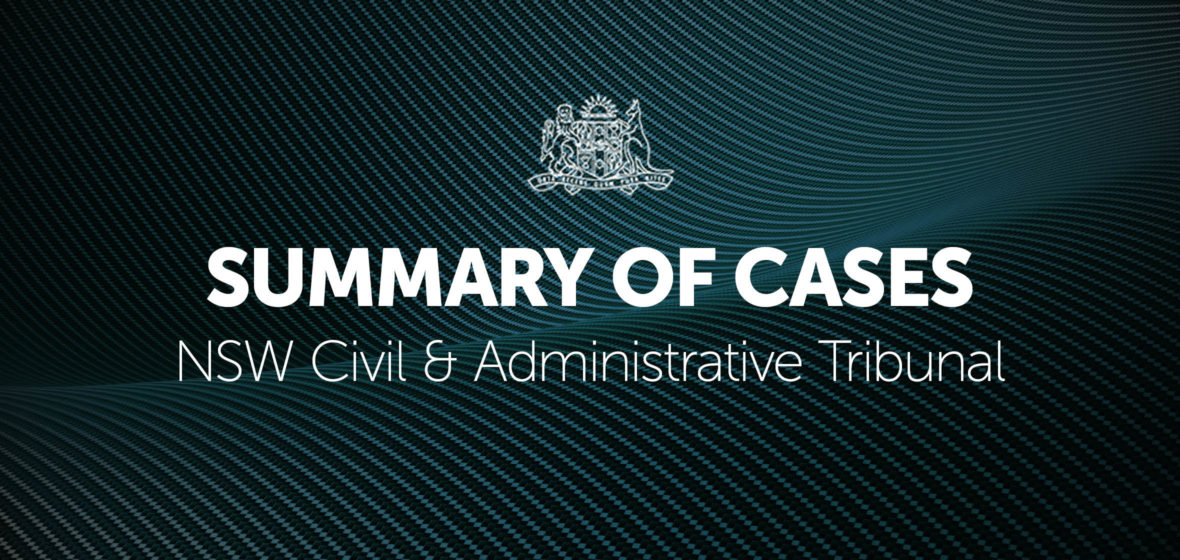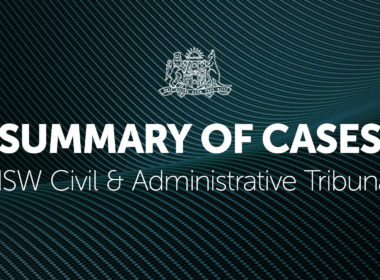The following are recent decisions made by NCAT.
Quinones v Council of the Law Society of New South Wales [2023] NSWCATOD 43
Decision Published: 3 April 2023
On 3 April 2023, the New South Wales Civil and Administrative Tribunal (Tribunal) published its decision in proceedings commenced by a solicitor, Ms Joseline Quinones, seeking a review of disciplinary findings made on 27 January 2022 by the Professional Conduct Committee of the Council of the Law Society of New South Wales (PCC) against her, in particular, a finding she engaged in unsatisfactory professional conduct by:
- failing to pay the invoice of the complainant, a barrister, in the sum of $17,600 (the Invoice) for work performed pursuant to a total of four (4) costs agreements (the Costs Agreements);
- failing to take money into trust for the payment of the complainant’s fees, which was a condition of the Costs Agreements;
- failing to advise her client of the Costs Agreements; and
- failing to pay the Invoice within the time period specified in the Costs Agreements.
Following the finding of unsatisfactory professional conduct the PCC made orders reprimanding Ms Quinones, requiring her to undertake further education and requiring her to apologise to the complainant.
Following a contested hearing of Ms Quinone’s review application, the Tribunal made orders:
- upholding the PCC’s unsatisfactory professional conduct finding, resolutions to reprimand Ms Quinones and to require her to complete further legal education; and
- varying the PCC’s resolution to require Ms Quinones to apologise to the complainant by ordering that Ms Quinones was not required to provide the apology. This was because, as at the date of the hearing, Ms Quinones had resolved her dispute with the complainant and the Council of the Law Society of New South Wales submitted that an apology was no longer warranted.
The Tribunal found:
[24] As is clear from the Uniform Law and the Conduct Rules, the earlier position of long-standing, that a solicitor was personally responsible to protect counsel for their fees and counsel could only seek their fees from the solicitor, has been modified by statute: Kenna v Lloyd [2021] NSWSC 1294 citing Petselis v Tatarka [2019] VSC 8.
[25] Solicitors who are responsible to pay counsel’s fees are also able to avail themselves of the ability to have counsel’s fees assessed, providing they do so within the stipulated time.
[26] In those circumstances, we do not agree that it constituted inappropriate conduct by the Solicitor worthy of disciplinary proceedings to have failed to pay the Complainant’s invoice, simpliciter, or even to have failed to do so in the time stipulated by the invoice. Nor do we think it is necessarily inappropriate conduct to fail to take monies into trust for counsel’s fees, where the solicitor has not sought to absolve themselves from personal responsibility for those fees, even if the solicitor has accepted a contractual obligation to do so. Had the solicitor sought to absolve themself from personal responsibility for payment of fees and then failed to comply with a contractual obligation to ensure sufficient monies to cover the proposed fees were collected into trust, different findings may be warranted.
…
[30] Here, the Solicitor failed to remedy her personal obligation to pay the Complainant’s fees for a period of over three years. She did so in the context of also failing to seek to have Complainant’s fees assessed within the 12 months provided for her to take that course, set out in ss 198(3)-(4) of the Uniform Law (Solicitor’s affidavit of 28/10/2022 at par 7). She also failed to pay the sum of $4,400 that she never disputed, within the time required by the Complainant’s invoice or to make a substantial payment in an amount properly reflecting the ultimately compromised amount of the fees in a timely way. In the circumstances, that conduct constituted unsatisfactory professional conduct, as eventually conceded by the Solicitor. The Solicitor also conceded through her counsel that findings on these terms would not infringe the principles in Smith v New South Wales Bar Association and Kerin v Legal Practitioners Complaints Committee, supra.


